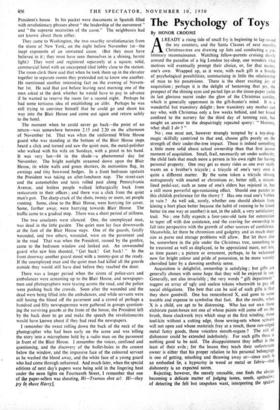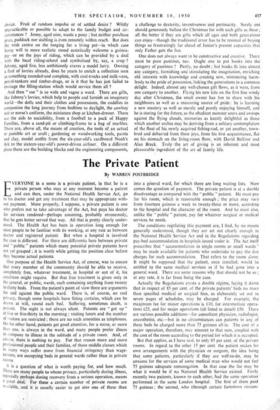The Psychology of Toys
By HONOR CROOME
ALREADY a rising tide of small fry is beginning to lap round the toy counters, and the Santa Clauses of next month's Christmas-tree are drawing up lists and conducting a pre- liminary reconnaissance. Watching fellow-parents cruising slowly around the paradise of a big London toy-shop, one wonders what
motives will eventually prompt their choice, or, for that matter, one's own. Wrapped up, as it were, with each gift is a bundle of psychological possibilities, summarising in little the relationship of man to his poss'essions. There is the sheer exciting joy of acquisition ; perhaps it is the delight of bestowing that joy, the prospect of the shining eyes and parted lips as the tissue-paper yields its last glorious secret under the glow of the Christmas candles, which is generally uppermost in the gift-hunter's mind. It is a wonderful but transitory delight ; how transitory any mother can
say who, with Christmas only a few weeks behind, and her brood confined to the nursery for the third day of teeming rain, has sought an answer to the despairingly repeated query : " M ummy, what shall I do ?"
No; one must not, however strongly tempted by a toy-shop- magic skilfully contrived to that end, choose gifts purely on the strength of their under-the-tree impact. There is indeed something a little more solid about actual ownership than that first joyous moment of acquisition. Small, frail, necessarily set under authority, the child feels that much more a person in his own right for having personal property. One may get as many rides as one ever really wants on a brother's tricycle ; a tricycle of one's very own is quite a different matter. By the same token a tricycle shining outrageously with enamel or chromium or, better still, a stream- lined pedal-car, such as none of one's elders has rejoiced in, has a still more powerful ego-sustaining effect. Should one pander to this childish preference for the showy ? Has one read one's Veblen in vain ? As well ask, surely, whether one should abstain from kissing a hurt place better because the habit of running to be kissed better (in one way or another) is not, in the adult, a very satisfactory trait. No; one fully expects a four-year-old taste for ostentation to taper off with due assistance, and the craving for ownership to fall into perspective with the growth of other sources of confidence. Meanwhile, let there be chromium and gadgetry and as much sheer size as purse and storage problems will allow. But let there also be, somewhere in the pile under the Christmas tree, something to be treasured as well as displayed, to be appreciated more, not less, as time passes ; a picture or ornament, perhaps, to be welcomed now for bright colour and pride of possession, to be more warmly cherished later by a dawning aesthetic sense.
Acquisition is delightful, ownership is satisfying ; but gifts are generally chosen with some hope that they will be enjoyed in use. Generally, not alas invariably ; the very words "gift department" suggest an array of ugly and useless tokens wherewith to pay off social obligations. The best that can be said of such gifts is that they show goodwill. One has remembered X, and gone to some trouble and expense to symbolise that fact. But the results, when X is a child, are apt to be distressing. Who has not seen those elaborate paint-boxes not one of whose paints will come off on the brush, those clockwork toys which snap at the first winding, those tool-kits without a cutting edge, those sewing-sets whose scissors will not open and whose materials fray at a touch, those raw-edged metal fancy goods, those voiceless mouth-organs ? The roll of dishonour could be extended indefinitely. For such gifts there is nothing good to be said. The disappointment they inflict is the least of their evils ; for the lesson they teach their unfortunate owner is either that his proper relation to his personal belongings is one of getting, smashing and throwing away or—since each is an embodied lie, a hypocrisy in wood or metal or fabric—that dishonesty is an expected norm.
Rejecting, however, the merely unusable, one finds the choice becoming a delicate matter of judging tastes, needs, aptitudes ; of detecting the felt but unspoken want, interpreting the spoken choice. Fruit of random impulse or of settled desire ? Wildly impracticable or possible to adapt to the family budget and cir- cumstances? Jenny, aged nine, wants a pony ; but neither purchase price, paddock nor stabling is even remotely within reach. But does the wish centre on the longing for a living pet—in which case Jenny will in more realistic mood ecstatically welcome a guinea- pig—or on the joys of riding, which can be provided by a deal with the local riding-school and symbolised by, say, a crop ? Johnny, aged five, less ambitiously craves a model lorry. Owning a fleet of lorries already, does he yearn to enrich a collection seen as something roundediand complete, with coal-trucks and milk-vans, petrol-tankers and timber-drags, or is it that he has just failed to envisage the filling-station which would service them all ?
And then " use " is so wide and vague a word. There are gifts, like Johnny's lorries, which help to people and furnish an imaginary world—the dolls and their clothes and possessions, the cuddlies to companion the long journey from bedtime to daylight, the cowboy suit or nurse's uniform, the miniature shop or kitchen-dresser. There aie the aids to sociability, from a football to a pack of Happy Families, from a sand-pit or climbing-frame to a bag of marbles. There are, above all, the means of creation, the tools of an actual or poisible art or craft ; gardening or woodworking tools, paints and clay, model outfits from' the six-year-old's cardboard Noah's Ark to the sixteen-year-old's power-driven airliner. On a different plane there are the building blocks and the engineering components, a challenge to dexterity, inventiveness and pertinacity. Surely one should generously ballast the Christmas list with such gifts as these ; all the better if they are gifts which all ages and both generations can enjoy—though the traditional error has to be resisted of buying things so frustratingly far ahead of Junior's present capacities that only Father gets the fun.
One does not always want to be constructive and creative. There must be pure pastimes, too. Ought one to put books into the category of pastimes ? Partly, no doubt ; but books fit into almost any category, furnishing and stimulating the imagination, enriching old interests with knowledge and creating new, ministering harm- lessly to the pride of possession, linking the generations in a common delight. Indeed, almost any well-chosen gift flows, as it were, from one category to another. Flying his new kite on the first fine windy day after Christmas, the small owner has fun to share with his neighbours as well as a reassuring source of pride : he is learning a new mastery as well as merely and purely enjoying himself, and he is storing for the future, as the obedient monster soars and swoops against the flying clouds, memories as keenly delightful as those which another urchin may be deriving from a solitary contemplation of the float of his newly acquired fishing-rod, or yet another, town- bred and debarred from these joys, from his first acquaintance, flat on his stomach on the living-room floor, with David Balfour and Alan Breck. Truly -the art of giving is an inherent and most pleasurable ingredient of the art of family life.



















































 Previous page
Previous page